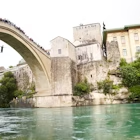

Devin Castle near Bratislava, Slovakia, occupies a commanding position at the confluence of the Danube and Morava rivers. TomasSereda / Getty Images
With its rich history, diverse landscapes and hearty food and drink, Eastern Europe is firmly on the map for more travellers than ever before. But growing popularity and improved accessibility can mean larger crowds and strained infrastructure.
- placement: fullWidth
- path: articles/in-content-top
- possible size: [970, 250], [970, 90], [728, 90], [300, 250], [320, 50], [1, 1],
- targeting:
{ "url": "where-to-escape-the-crowds-in-eastern-europe" }
Thankfully, it’s never been easier to look beyond the most obvious spots – and Eastern Europe abounds with great alternatives, whether you want to stroll ancient ruins, sample wine or take to the water. Check out our insider tips to find the perfect getaway just a stone’s throw from the region’s most popular cities.

Rafting the Vltava River in Český Krumlov, Czech Republic
Prague deserves the hype. But the number of visitors it draws has left this baroque capital’s infrastructure buckling. The same ornate beauty can be found in miniature only a two-hour drive away. In southern Bohemia, tiny Český Krumlov takes ‘quaint’ to a new level. The town is a Unesco World Heritage Site and a popular day trip from Prague and Linz, resulting in large groups exploring the tiny cobbled streets. But staying for two or three nights means you can enjoy the charm of the quiet evenings. In the daytime, the ultimate way to escape the crowds is by taking to the water. Maleček Rafting & Canoe offer a range of options on the Vltava River. Arguably the best route sets off just outside Český Krumlov where the river cuts between hilly forests. From the water, you’ll capture a much better angle of the pastel-hued Renaissance castle and riverside restaurants. The experience reaches a fitting climax thanks to the dozen weir slides, down which you swoop en route to the finish line.
- placement: fullWidth
- path: articles/in-content-middle
- possible size: [970, 250], [970, 90], [728, 90], [300, 250], [320, 50], [1, 1],
- targeting:
{ "url": "where-to-escape-the-crowds-in-eastern-europe" }
Discovering ancient ruins at Devin Castle, Slovakia
Often overshadowed by its neighbours, Bratislava draws travellers on the Eastern Europe circuit between Budapest and Vienna for a pit stop at its magnificent Castle and Old Town Square. But perhaps Slovakia’s greatest beauty resides in its wild countryside, and you don’t have to travel far from the capital to find it. Immerse yourself in the country’s rich history at Devin Castle just 12km (7.5 miles) away. Perched on craggy rocks, the medieval castle’s settlements date back to the 5th century BC. The view over the river and surrounding hills is reason enough to visit, never mind the archaeological exhibition and ancient crumbling walls.

Hiking in Sutjeska National Park, Bosnia & Hercegovina and Montenegro
Sarajevo sits in a valley surrounded by mountains, so it’d be a shame not to strap on your boots and take to the trails. There’s no better place to do it than Sutjeska National Park, a few hours’ drive from Bosnia & Hercegovina’s capital. Organising a guided tour is probably the best way to get off the beaten track here, as parts of the park are inaccessible by car. Green Visions run tours from the capital, featuring treks and a picnic in the heart of Sutjeska. You can leave the tarmac behind completely at Trnovačko Lake, as a trail is the only way to get there. A two-hour hike takes you via a mountain pass in Bosnia and over a hill into Montenegro to the heart-shaped Trnovačko Lake. After another short climb, you reach a viewpoint that reveals the lake in all its amorous glory; no wonder it’s a popular spot for popping the question.
- placement: native
- path: articles/in-content-native
- possible size: [f, l],
- targeting:
{ "url": "where-to-escape-the-crowds-in-eastern-europe" }

Sun-seeking on the sleepy island of Šolta, Croatia
Just off the coast of Split, the sleepy island of Šolta beckons weary travellers with its rocky coves and hidden beaches. Cheaper, more rustic and quieter than neighbouring Brac and Hvar, Šolta is your Croatian island of choice for a relaxing getaway. Once you’ve tackled the historic sights of Split, take to the glistening water beyond the harbour; Šolta is only a 30-minute ferry ride away. Split is heaving in summer and Croats and other Balkan holidaymakers also tend to visit the islands in this period, so visit the region out of season to feel like you have the lush, tree-lined beaches, crystal-clear waters and inviting portside restaurants all to yourself. One of the best ways to explore Šolta's towns is to hire bicycles and cycle the 13km (nine miles) over undulating hills between Maslinica and Rogac, stopping off at villages on the way. Either way, find yourself at the far end of the island at the port town of Maslinica, where you can seek out the island’s best beach and swimming spot, with only a yacht or two for company.
Sampling wine in the volcanic hills at Lake Balaton, Hungary
Only two hours away from Budapest, Lake Balaton – the largest freshwater lake in Europe – is where local and international visitors come to sun themselves and swim in the summer. Dotted along the lake, the gorgeous but popular towns of Balatonfured and Tihany can get busy, especially at the height of summer. Head to waterside town Keszthely instead, with its quaint themed museums, little beaches and colourful streets. Then visit the vineyards for wine-tasting in Somló, nestled on the slopes of the Somló Mountain, home to Hungary’s smallest wine region. It’s here that you can taste full-bodied white wine produced on the volcanic soil. The unique terroir helps create a smoky white wine from the black basalt bedrock, the remnant of ancient lava flows and the sandy topsoil.
Paragliding in Triglav National Park, Slovenia
Triglav National Park is the essence of rural Slovenia. River gorges, canyons, streams, meadows and forests cover the landscape in Slovenia’s only national park, home to The Julian Alps. You don’t need long in Slovenia’s small and slow-moving capital, Ljubliana, so moving on to Triglav seems more than appropriate after a couple of days of feasting on dumplings, goulash and cream cake, and strolling along the leafy river’s bridges and around the city's castle. In the park, there are hiking trails and mountain passes along with the exhilarating Mt Triglav climb. Visitors can also fish, raft and find quiet swimming spots. And within Triglav lies Lake Bohinj. There’s forever been a Bled versus Bohinj debate on which is the most beautiful, but you can safely say Bohinj wins when it comes to fewer tourists and more adventure. To name just a few activities, you can choose between kayaking, SUP, climbing and horseback riding. But for the ultimate high, team your outdoor pursuits with a moment of calm and take to the skies with an aerial view of the lake by paragliding. Floating above the lake and mountains here is just spectacular; an oasis of quiet and calm for thrill seekers.
- placement: fullWidth
- path: articles/bottom
- possible size: [970, 250], [970, 90], [728, 90], [300, 250], [320, 50], [1, 1],
- targeting:
{ "url": "where-to-escape-the-crowds-in-eastern-europe" }
Explore related stories



 Festivals & EventsHighlights of western Serbia: Europe's little-visited winter wonderland
Festivals & EventsHighlights of western Serbia: Europe's little-visited winter wonderlandOct 18, 2019 • 6 min read

 Wildlife & NatureNovel adventures: how to recreate six great literary journeys
Wildlife & NatureNovel adventures: how to recreate six great literary journeysFeb 27, 2019 • 8 min read




